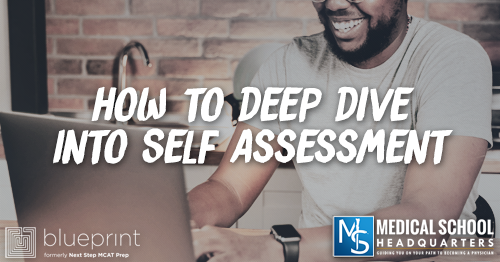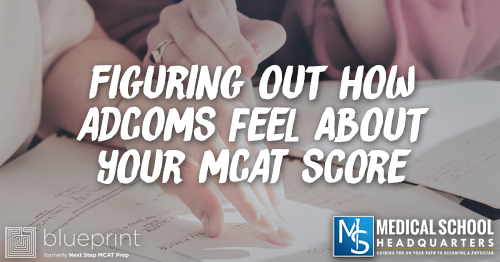Apple Podcasts | Google Podcasts

Session 169
Know your theories of emotion and physiological response for the MCAT! Today, we’re joined by Phil from Blueprint MCAT (formerly Next Step Test Prep) as we’re comparing the James Lange, Cannon Bard, and Schachter Singer models. Specifically, we’re looking into the AAMC MCAT Outline 6C Category.
I noticed students focus too much on grades and the MCAT, but not enough on the rest of their story and journey. And this is one of the many common mistakes students make. Check out The Premed Years Podcast to help you work on your application holistically.
Listen to this podcast episode with the player above, or keep reading for the highlights and takeaway points.
[02:30] Things You Should Know About the 6C
This category is about stress and emotion. They’re going to test how well you understand theories of emotion and how that interacts with physiologic responses.
[03:20] #1: Emotion
When talking about the fight or flight response, most people think that emotion occurs first. You feel afraid thereby it’s causing your sympathetic system to activate. But that’s not necessarily the case. It’s more complex than that.
They can measure the conductance of your skin which is affected by the sympathetic system. They can also measure what’s going on in the different regions of your brain like MRIs, PET scans, and EEGs.
'The emotion doesn't always come before the physiologic response. Sometimes, the physiologic response occurs first.'Click To TweetThere are three different theories of emotion, namely:
- James-Lange Theory
- Cannon-Bard Theory
- Schachter-Singer Theory
[04:40] The James-Lange Theory
This theory says that you must have a physiologic response that causes an emotional response. For instance, a spider goes into your nose and this activates your sympathetic system and that causes fear.
'It's the physiological response causing the emotional response rather than vice-versa.'Click To Tweet[05:10] The Cannon-Bard Theory
This theory suggests that the stimulus causes both the physiologic and the emotional response. The spider on your nose then causes fear and sympathetic activation at the same time. But neither of those things cause each other.
[05:38] The Schachter-Singer Theory
The idea here is that a stimulus causes the physiologic response (just like James-Lang theory). But then they built some room here for the cognitive appraisal.
The way the spider got to your nose causes the physiologic response. Then you remember the spider is your friend so you’re not actually afraid even though you’ve got that sympathetic response and your heartbeat is faster.
Another example is what happens when you’re riding the rollercoaster. Normally, heights and high speeds make you afraid because it’s dangerous. But you know that you’re safe.
So you’re not actually afraid even though you have a heightened heart rate, your pupils are dilated, and your skin is flushing. All of these things are actually the physiologic response of fear without the emotional aspect of it.
“There is room for cognitive appraisal so you can think about what’s going on there.”Click To Tweet[07:45] What the MCAT Is Going to Test On
'Stories are always the best way to remember anything.'Click To TweetScenario #1:
Billy is allergic to bee stings and he has been stung for the 14th time this week. Billy comes into the hospital and is given a shot of epinephrine. Billy is not afraid of needles and he knows he’s going to get better because it’s the third time today that this has happened.
Question: Under which of these theories will the shot of epinephrine cause him to feel fear?
Notes:
Epinephrine causes the sympathetic response. It’s the adrenalin and the fight or flight thing response going on here. Hence, this question is a very complex way to ask in what scenarios will a physiologic response cause an emotional response?
Discussion:
Under the James-Lange theory, the physiologic response causes the emotional response. So the shot of epinephrine is going to cause him to feel fear even though he knows he’s going to be fine. There’s no room for cognitive appraisal in James-Lange theory.
As with the Cannon-Bard theory, the stimulus causes both the physiologic response and the emotional response. The epinephrine here just jumpstarts the physiologic response. This is not going to lead to the emotional response under this theory. So while in the James-Lange theory, he’s going to be afraid. But under this theory, he isn’t going to be afraid.
Under Schachter-Singer, we have room for cognitive appraisal. The physiologic response can lead to fear if he rationalizes through this to feel fear. But in this case, he knows he’s going to be fine. Cognitively, he’s not going to be afraid even though the physiologic response is occurring.
But if this is the first time that happened to him, he’s going to be panicking. Cognitively, he’s in a scary hospital room and not aware of what’s going on. There’s a reason to be afraid in this case. The psyche of the patient is actually going to cause a difference in whether or not the emotion is actually experienced.
'Schachter-Singer is one of the more complex ones so you have to be careful because of this cognitive appraisal.'Click To Tweet[11:25] Separate to Understand
The MCAT is going to ask things where they know students can get confused. Focus on the differences between them. The MCAT is going to ask about the complex stuff.
'Focusing on the differences is huge.'Click To Tweet[14:30] #2: Stress: Eustress vs. Distress
The fight or flight thing is more of a short-term stress response. While an example of long-term stress is not having enough money for rent chronically or the MCAT is coming up.
Stress isn’t always a bad thing. There are good stressors in your life at some point. For instance, it’s stressful to become a doctor but you don’t want to do it. So it’s a good stressor in your life.
'Stress isn't always bad. It's one of the things that drive you to accomplish things.'Click To TweetHow you respond to that stress has a lot to do with what’s going on inside your head. A lot of what makes a eustress and a distress is more of a psychological appraisal, going back to the Schachter-Singer stuff.
Sometimes, changing your perspective changes not just how you feel about this but also some stuff with the physiology.
Distressors tend to release cortisol. Evolutionary speaking, a caveman is not going to be stressed because he has to take the MCAT or taxes are due. What stresses out a caveman in terms of long-term stress is getting enough food.
So the cortisol evolves to be something related to this stress response of not having enough food. When you have this cortisol release, it makes you hungry. It’s going to make you eat more food. It also causes you to release glucose into your blood, raising your blood sugar. This is something you need when you’re starving.
It causes you to increase fat deposition in the form of stored fat in the central body. It also causes you to be tired to conserve energy. It causes your immune system to be suppressed. Cortisol has all these interesting things that make sense if you’re starving to death.
[19:08] Switching from Distress to Eustress
'Changing your perspective on this is important because you can go from distress to eustress.'Click To TweetFor example, instead of looking at all these things you still have to do prior to MCAT test date, look at what you’ve accomplished so far and then you feel good about it. So this becomes less of a distressor.
[19:32] Effects of Cortisol on Memory and How It Can Help You with Your MCAT
Cortisol affects memory. It has been shown in multiple experiements that cortisol impacts the hippocampus, the region of your brain dealing with long-term memory.
Kids who grow up in stressful scenarios actually have a smaller hippocampus. So they have a harder time with memory.
'You need to be aware of the effects of cortisol.'Click To TweetThe MCAT is going to test your knowledge. At the same time, it’s useful to be knowing a lot of things while you’re studying for the MCAT. It ends up useful to your life on top of just memorizing things.
Exercise tends to suppress cortisol. Even if spend more time studying, the cortisol could push things down. Hence, you need to break up your MCAT studying. Exercise because it will help you in the end.
Another thing to keep in mind is the way you study for the orgo test is to do nothing else the week before it. This works better short-term. But if you’re studying for four months, you cannot go hardcore, nonstop for four months. Otherwise, you’re going to burn out and you’re going to be worse at learning.
Again, switch from distress to eustress. Instead of building up this mountain of stuff you need to do, build a schedule or structure. Don’t obsess on the pile of information you need to learn. Deal with it on a daily basis instead so you feel great at the end of the day that you were able to accomplish it. Your cortisol drops. You feel better.
“Switch from distress to eustress.”Click To Tweet[24:50] Blueprint MCAT (formerly Next Step Test Prep)
Check out Next Step’s MCAT Course. To know more about this, go to MCATCourseReview.com and watch this YouTube video of the course. Get access to the best full-length exams outside of the AAMC’s as well as live office hours everyday.
Links:
SEARCH SITE
SEARCH SITE
LISTEN FOR FREE











